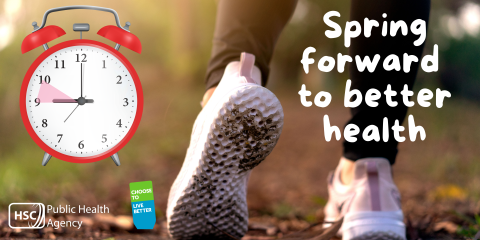Spring forward to better health

As the clocks spring forward this weekend the Public Health Agency (PHA) is encouraging people to use the brighter nights to increase their levels of physical activity and improve their health.
Colette Brolly, the PHA’s lead on physical activity, said: “Over the winter months when it is dark in the evenings, it can be easy to get into a routine of staying inside and being less active, but the bright nights are a brilliant opportunity to get out and get active.
“There are many different ways to be active and many of them are ideal for anyone who has not been physically active for a while, such as walking, gardening, swimming or playing outside with the kids.”
One of the simplest ways to get active is to increase your step count and get out for a walk when you can. Walking is completely free and can done in your leisure time or be added into your daily routine through small things like walking to the shop, school or work instead of taking the car.
“Walking has great health benefits,” said Colette.
“A brisk walk can reduce anxiety, help manage your weight, reduce blood pressure and help you sleep better. The average number of steps a person takes each day is between 3,000 and 4,000, so most of us could do with getting a bit more active and boosting those numbers.”
Tips on increasing your physical activity
- Try to find an activity that you enjoy as you are then more likely to continue doing it;
- Get active with a friend or colleague, this can motivate you to start and stay active;
- Try walking or cycling for either part of, or your entire, journey to work. If you are working from home aim for a walk before or after work, or during your lunchtime;
- If you have to drive or take the bus, park the car a little further away from your destination or hop off the bus a stop or two earlier and walk the rest of the way;
- When you’re out and about take the stairs instead of the lift to get your legs moving;
- During your lunch break, go for a walk rather than sitting at your desk. A 10-minute brisk walk adds to your recommended physical activity target and will help you feel better;
- When you get home in the evening, instead of spending the evening in front of the TV, get active. Get the kids involved too and go to the park with them on their bikes or for a kick about with the football.
- Consider joining a local walking group.
The PHA’s website www.choosetolivebetter.com offers lots of tips on the best ways to get active and also advice on healthy eating and setting targets for getting healthier.
- The Chief Medical Officer (CMO) recommends each week, adults should accumulate at least 150 minutes (2 1/2 hours) of moderate intensity activity (such as brisk walking or cycling); or 75 minutes of vigorous intensity activity (such as running); or even shorter durations of very vigorous intensity activity (such as sprinting or stair climbing); or a combination of moderate, vigorous and very vigorous intensity activity.
- Children and young people should engage in moderate-to-vigorous intensity physical activity for an average of at least 60 minutes per day across the week
- Any physical activity however is better than none.
- Being physically active can help improve mental health by lifting mood, reducing anxiety and helping to protect against depression. Being physically active helps maintain a healthy weight and can reduce the risk of many diseases including heart disease, Type 2 diabetes, breast cancer, and colon cancer.
